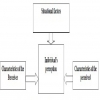Management Concepts & Organisational Behaviour - Perception And Learning
Learning - Perception And Learning
Posted On :
Now, let us understand the term ‘learning’ and the various processes of learning.
Learning
Now, let us understand the term ‘learning’ and the various processes of learning. Learning is any relatively permanent change in behaviour that occurs as a result of experience. There are two important elements in learning:
Change must be relatively permanent. It means after ‘learning’ the behaviour of a person must be different from the previous behaviour. If a person learns car driving, it will last for a long time indicating the changed behaviour. Temporary changes may be only reflexive and fail to represent any learning. Therefore, this requirement rules out behavioural changes caused by fatigue or other temporary adaptations.
The second element is that the change of behaviour should take place as a result of some kind of experience. Learning must be because of some interaction with the environment and some feedback from such environment that affects behaviour. The experience may be direct or indirect. Sometimes we learn to change our behaviour when our colleagues are punished for that kind of behaviour.
You may note that learning itself cannot be observed. The behavioural changes consequent upon learning only can be seen. This kind of change in behaviour should be differentiated from change in behaviour caused by other factors. For example, aging may cause behavioural changes. A change in the individual’s thought process or attitudes, if accompanied by no change in behaviour, would not be learning.
Learning certainly has its own impact on training activities in an organization. It can give insights into how to best develop the skills and talents of employees for performing the jobs effectively. But it is the desire to change individuals that is of the greatest importance. The manager who undertakes to produce such changes acts like a teacher. He guides the employees to engage in behaviours that will help the organization achieve its objectives. When the employees are late for work, lazy, disobey the rules or engage in any type of dysfunctional behaviour, the manager attempts to teach behaviours of functional nature. Further, if the employee is performing well, he gives the employee feedback and also rewards to strengthen such desirable behaviour.
You may understand that individuals enter an organization with a host of learned attitudes and behaviours. Their job performance is a function of their learned experiences. Learning is a continuous experience for employees. It is because of learning, employers recruit people with college degrees or those with job experience. The employer presumes that not only education or experience provides learning, but that learning will lead to higher job performance.
Now, let us understand the term ‘learning’ and the various processes of learning. Learning is any relatively permanent change in behaviour that occurs as a result of experience. There are two important elements in learning:
Change must be relatively permanent. It means after ‘learning’ the behaviour of a person must be different from the previous behaviour. If a person learns car driving, it will last for a long time indicating the changed behaviour. Temporary changes may be only reflexive and fail to represent any learning. Therefore, this requirement rules out behavioural changes caused by fatigue or other temporary adaptations.
The second element is that the change of behaviour should take place as a result of some kind of experience. Learning must be because of some interaction with the environment and some feedback from such environment that affects behaviour. The experience may be direct or indirect. Sometimes we learn to change our behaviour when our colleagues are punished for that kind of behaviour.
You may note that learning itself cannot be observed. The behavioural changes consequent upon learning only can be seen. This kind of change in behaviour should be differentiated from change in behaviour caused by other factors. For example, aging may cause behavioural changes. A change in the individual’s thought process or attitudes, if accompanied by no change in behaviour, would not be learning.
Learning certainly has its own impact on training activities in an organization. It can give insights into how to best develop the skills and talents of employees for performing the jobs effectively. But it is the desire to change individuals that is of the greatest importance. The manager who undertakes to produce such changes acts like a teacher. He guides the employees to engage in behaviours that will help the organization achieve its objectives. When the employees are late for work, lazy, disobey the rules or engage in any type of dysfunctional behaviour, the manager attempts to teach behaviours of functional nature. Further, if the employee is performing well, he gives the employee feedback and also rewards to strengthen such desirable behaviour.
You may understand that individuals enter an organization with a host of learned attitudes and behaviours. Their job performance is a function of their learned experiences. Learning is a continuous experience for employees. It is because of learning, employers recruit people with college degrees or those with job experience. The employer presumes that not only education or experience provides learning, but that learning will lead to higher job performance.
Tags : Management Concepts & Organisational Behaviour - Perception And Learning
Last 30 days 963 views














